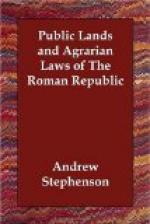In the following year, 411, Lucius Sextius, in no way discouraged by the ill success of his predecessors, proposed the establishment of a colony at Bolae, a town in the country of the Volscians, which had been recently conquered. The patricians[28] opposed this by the same method which they had adopted in the preceding case, the veto by tribunes. Livy criticises the impolitic opposition of the patricians in these words: “This was a most seasonable time, after the punishment of the mutiny, that the division of the territory of Bolae should be presented as a soother to their minds; by which proceeding they would have diminished their eagerness for an agrarian law, which tended to expel the patricians from the public land unjustly possessed by them. Then this very indignity exasperated their minds, that the nobility persisted not only in retaining the public lands, which they got possession of by force, but would not even grant to the commons the unoccupied land lately taken from the enemy, and which would, like the rest,[29] soon become the prey of the few.”
In 409, Icilius, without doubt a member of that plebeian family which had furnished so many stout defenders of the liberties of the people, was elected tribune of the people and brought forward an agrarian bill, but a plague broke out and hindered any further action. In 407, the tribune, Menius, introduced an agrarian bill and declared that he would oppose the levies until the persons who unjustly held the public domains consented to a division. A war broke out and agrarian legislation was drowned amid the din of arms. Some years now elapsed without the mention of any agrarian laws. The siege of Veii commenced in 406 and lasted for six years, during which time military law was established, giving occupation and some sort of satisfaction to the plebeians. In 397, an agrarian movement was set on foot, but the plebeians were partially satisfied by being allowed to elect one of their number as tribunus consularis for the following year, thus obtaining a little honor but no land. After the conquest of Veii, there was a movement on the part of the plebeians to remove from Rome and settle upon the confiscated territory of the Veians; this was only staid by concessions on the part of the patricians. A decree of the senate was passed,—“that seven jugera, a man, of Vientian territory, should be distributed to the commons and not only to the fathers of families, but also that all persons in their house in the state of freedom should be considered, and that they might be willing to rear up children[30] with that prospect.” In 384, six years after the conquest of Rome by the Gauls, the tribunes of the year proposed a law for the division of the Pomptine territory (Pomptinus Ager) among the plebeians. The time was not a favorable one for the agitation of the people, as they were busy with the reconstruction of their houses laid waste by the Gauls, and the movement came to nothing. The




